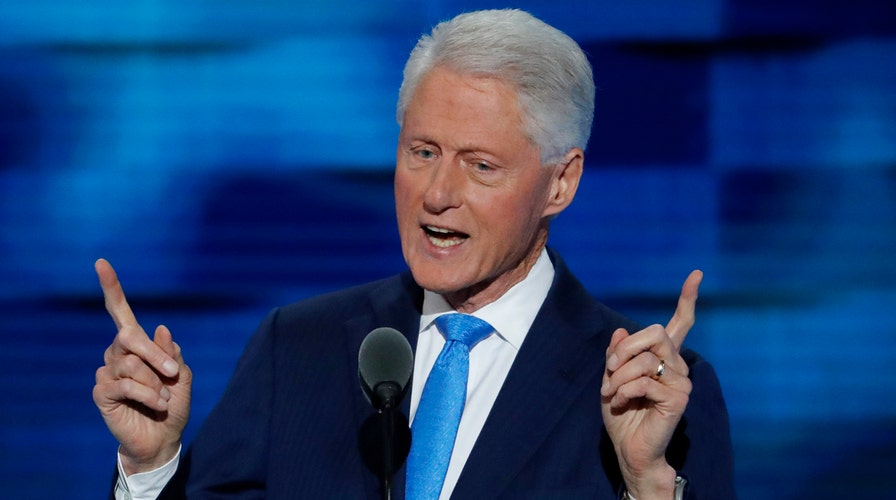Full speech: Bill Clinton at the Democratic convention
Former president of the United States makes case for his wife at the Democratic National Convention
Hillary Clinton did not speak at the Democratic National Convention in 1992 when her husband was nominated. At the time there was no precedent for spouses making convention speeches unless they were already First Lady -- Eleanor Roosevelt 1940, Pat Nixon 1972, Nancy Reagan 1984, and Barbara Bush 1992.
That all changed in 1996 when Elizabeth Dole, wife Republican nominee Bob Dole, addressed the convention. Dole broke ground as the first non-incumbent first lady to address a national political convention.
Her goal? To humanize her husband. Since then, all candidates’ spouses have followed suit.
Tuesday night in Philadelphia it was Bill Clinton’s turn. He not only gave a long address, but tried to introduce voters to another side of his wife.
This was not an easy task because Hillary Clinton is one of the most well-known and controversial figures in America, if not the world. Moreover, she is someone that most Americans have strong opinions about already.
After all, Clinton has been in the public eye for more than thirty years, as first-lady, a Senator from New York, Secretary of State and twice a candidate for president.
Nevertheless, Bill Clinton managed to tell us a few things we didn’t know about her – the long, flowery white skirt she was wearing the second time they met, how she lined the drawers of Chelsea Clinton's dorm room at Stanford, and how she turned down his first marriage proposal on the shores of Lake Ennerdale.
In between these personal accounts he wove in bits about her professional biography, as well as her political and policy commitments. By most accounts, these aspects of the speech were less effective and engaging than the personal narrative.
But as standard as the speech was on its face, Bill Clinton is not Elizabeth Dole, or Laura Bush or Tipper Gore. For one thing, he is the first potential first-gentlemen to speak and he is also the first former president to do so. And, unlike most spouses in the past, he was charged with not only trying to humanize his wife, but with trying to convince voters she is trustworthy. Since one of the latest polls found almost 7 in 10 Americans don’t trust Hillary Clinton that was not an easy task.
Finally, and perhaps most importantly, Bill Clinton came to the speech with more baggage then most other spouses do.
He is someone who is famously flawed in ways that have negatively impacted his wife.
This is in part why the first line of his speech last night -- “in the spring of 1971 I met a girl” -- was the subject of so much criticism. It wasn’t only the use of the term “girl” to describe his accomplished wife (not to mention the Democratic nominee for president), but the fact that Bill Clinton has a reputation as a womanizer, someone who had an inappropriate relationship in the Oval Office with an intern, someone who as a result became only the second president in history to be impeached, someone who put his wife out on television – not only during the 1992 campaign, but in the heat of the Lewinsky affair – to defend his actions.
The dichotomy between the person we saw on the stage Tuesday night describing the best friend that he married and the person whose reputation proceeds him left many people scratching their heads. Some suggested he should have addressed his bad behavior and its impact on his wife directly. Apart from saying he hoped Hillary didn’t regret marrying him, however, he neglected to do that.
So as ‘by-the-book’ as Bill Clinton’s speech was, it was also in many ways unprecedented. And no matter how other young men follow Bill Clinton’s path to potentially being the first-gentleman, it is unlikely we will see many who are tasked with the challenges he faced last night.
If Bill Clinton was almost any other spouse, male or female, the reaction to his speech would have likely been resoundingly positive – that is usually the case with spousal convention speeches (barring some Melania Trump-style controversy).
The mixed reviews Clinton received after his historic speech are reflective of the fact that he isn’t just any spouse and potential first-spouse, he’s a former president, one of the most well-recognized faces in the world, someone about whom most people have already formulated an opinion.
Putting him out there to re-introduce his equally well-known wife is not only unlikely to change opinions about her, but to elicit strong reactions -- both positive and negative – for what he did -- and didn't chose to say.









































